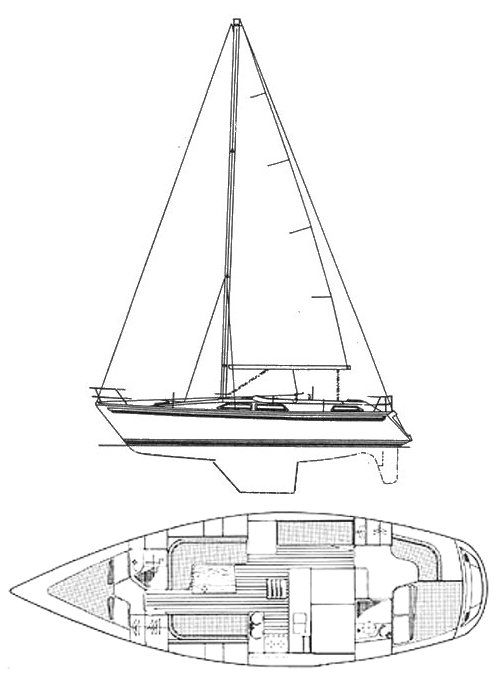The Moody 376, produced by the esteemed British builder Moody Yachts from 1985 to 1991, stands as a testament to robust construction and comfortable cruising. Designed by the prolific Bill Dixon, this center-cockpit monohull quickly earned a reputation as a capable offshore cruiser, ideal for families and couples seeking extended voyages or comfortable liveaboard experiences. An updated version of the earlier Moody 37, the 376 refined its predecessor's successful formula, offering enhanced features while maintaining the brand's core values of seaworthiness and quality.
Moody 376 Information, Review, Specs

- Make
- Moody
- Model
- 376
- Number Built
- Production Year(s)
- 1985 - 1991
History and Design
The Moody 376 emerged from a rich history of yacht building by A.H. Moody & Sons, a company that began as a repair yard in 1827 and evolved into a revered builder of cruising yachts. By the time the 376 was introduced in 1985, Moody Yachts had a well-established partnership with Marine Projects (Plymouth) Ltd., which manufactured its GRP (Glass Reinforced Plastic) vessels. This era saw Bill Dixon as a principal designer for Moody, known for his ability to craft spacious, comfortable, and performance-oriented cruisers.
The 376 was a direct evolution of the popular Moody 37, with the primary distinction being the addition of an integrated bathing/boarding platform at the transom, along with twin opening transom ports. This continuous development approach by Moody ensured that successful designs were refined and improved rather than completely reinvented. Dixon's design philosophy for Moody yachts focused on a blend of seakeeping, stability, and comfortable liveability, reflected in the 376's moderately proportioned hull. The builder's ethos, consistent throughout its history, emphasized solid construction and inherent seaworthiness, appealing to experienced sailors who prioritized offshore capability.
Sailing Performance and Handling
With a sail area to displacement ratio of approximately 16.22, the Moody 376 demonstrates reasonably good performance, striking a balance between light-air capability and robust handling in stronger winds. Its ballast to displacement ratio of 40% signifies a stiff and stable vessel, capable of standing up to a considerable amount of sail area even in challenging conditions. This contributes to a comfortable motion in a seaway, a characteristic often praised by owners. The displacement to length ratio of around 239.78 classifies the 376 as a moderate displacement cruiser, suggesting a boat that offers both comfortable motion and respectable cruising speeds without being overly heavy or sluggish.
Owners generally describe the Moody 376 as a joy to handle, noting its balanced rig and responsive steering. Its moderate fin keel and conservative hull shape contribute to predictable handling, particularly appreciated during low-speed maneuvers in confined spaces. The center-cockpit configuration, combined with all sail controls led aft, allows for a secure and uncluttered deck, facilitating single-handed or short-handed sailing.
Accommodations and Layout
Below deck, the Moody 376 is renowned for its spacious and comfortable accommodations, offering berths for up to seven people in a classic teak interior. The layout typically features two private cabins, often with an additional passage berth and the saloon settees converting to provide extra sleeping capacity. A key highlight is the generous aft cabin, designed as the owner's stateroom, which features a wide double berth and often includes its own en-suite head, offering a private retreat.
The saloon provides a welcoming living space, with ample headroom, reportedly around 2 meters (approximately 6 feet 6 inches), and comfortable seating. The galley is typically well-equipped with a hob, oven, and refrigerator, making it suitable for extended cruising. Throughout the interior, the use of traditional joinery and quality materials, a hallmark of Moody Yachts, provides a warm and inviting atmosphere. Storage is abundant, catering to the needs of long-distance cruisers.
Owner's Perspectives
Owners consistently praise the Moody 376 for its solid construction, inherent seaworthiness, and comfortable motion, even in difficult conditions. Many highlight the spacious aft cabin as a significant advantage, particularly for couples seeking comfort and privacy on extended voyages. The boat's stability, both underway and at anchor, is frequently mentioned as a positive attribute, contributing to a secure feel.
However, common issues noted by owners include potential problems with the original mast compression post, which was made of cast iron and can rust over time, requiring replacement. As with many boats of its vintage, routine maintenance often involves addressing leaks from original deck fittings, necessitating re-bedding to maintain watertight integrity. Despite these potential maintenance items, the Moody 376 is widely regarded as a well-built, capable cruiser that offers excellent value for its size and comfort, fostering a strong community of appreciative owners worldwide.
Measurements
Construction & Hull
- Construction Material
- Fiberglass (Solid)
- Hull Type
- Monohull Sailboat
- Keel Type
- Fin
- Rudder
- 1x Skeg-Hung
- Ballast
- 6500 lbs
- Displacement
- 16250 lbs
- Water Capacity
- 66 gal
- Fuel Capacity
- 54 gal
Engine
- Engine Make
- Thornycroft
- Engine Model
- T80
- Engine Type
- —
- Engine HP
- 35
- Engine Count
- 1
- Drive Type
- —
- Fuel Type
- Diesel
Rig & Sails
- Rig Type
- Masthead Sloop
- P (Main Luff)
- 41.33 ft
- E (Main Foot)
- 14.16 ft
- I (Foretriangle Height)
- 47 ft
- J (Foretriangle Base)
- 15 ft
- Forestay Length (est)
- 49.34 ft
- Main Sail Area
- 292.62 sqft
- Foretriangle Sail Area
- 352.5 sqft
- Total Sail Area (Reported)
- 648 sqft
- Total Sail Area (Calc)
- 645.12 sqft
Dimensions
- LOA
- 37.83 ft
- LWL
- 31.16 ft
- Beam
- 12.5 ft
- Draft
- 5.5 ft
- Max Headroom
- -
- Air Draft
- -
Calculations
- Hull Speed
- 7.48 kn
- Pounds per Inch Immersion
- 1